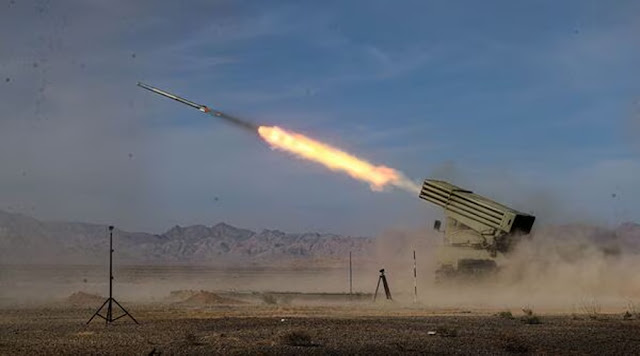Iran's Warning of Retaliation Against Israel and the US: A Detailed Overview
Tensions in the Middle East have reached a critical point following Iran's unprecedented direct attack on Israel, involving the firing of over 300 drones and missiles. Tehran has issued a stern warning, stating that it will strike again with even greater force if Israel or the US retaliate for the recent strike. This development has brought a years-long shadow war into the open and raised concerns about the potential for a broader conflagration in the region.
Tehran's armed forces' chief of staff, Maj Gen Mohammad Bagheri, emphasized that any Israeli retaliation against Iran would prompt a much larger response from Tehran. Additionally, Iran's foreign minister, Hossein Amirabdollahian, stated that the strikes on Israel were communicated as "limited" and for self-defense, with regional neighbors being informed several days in advance. This communication aimed to underscore the legitimacy and irrevocability of Iran's response against Israel.
The Israeli Defense Forces (IDF) claimed to have intercepted a significant portion of the launches during the mass strike, with some ballistic missiles reaching Israel and causing damage to the Nevatim airbase in the south of the country. The UK prime minister confirmed that RAF jets had intercepted Iranian drones involved in the attack, highlighting the potential fallout for regional stability if the attack had been successful.
As the situation unfolds, Israel has been on high alert, with warplanes reportedly targeting Hezbollah positions in southern Lebanon. The Gaza front has also seen continued conflict, with Hamas rejecting a ceasefire proposal and Israel vowing to pursue its conflict with "full force."
The United Nations Security Council is preparing to convene an emergency session in response to these developments, underscoring the gravity of the situation. The US president, Joe Biden, reaffirmed America's commitment to Israel's security and announced plans to coordinate a united diplomatic response with G7 leaders.
The recent escalation stems from the bombing of an Iranian diplomatic building in Damascus on April 1, which resulted in casualties, including a senior figure in Iran's Islamic Revolutionary Guards. This incident has fueled tensions and raised concerns about the potential for further retaliatory actions and a wider conflict in the region.
As the situation continues to evolve, the international community is closely monitoring developments and seeking to prevent further escalation in the region.
News Agencies

